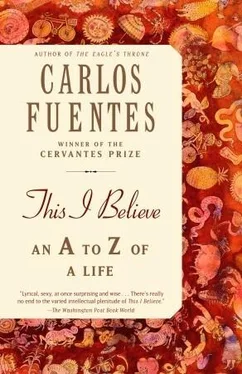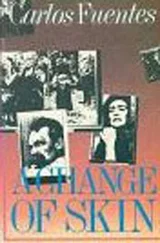For this reason the novel is much more than a reflection of reality; it creates a new reality, one that did not exist before (Don Quixote, Madame Bovary, Stephen Dedalus) but without which we could not imagine reality as we know it. As such, the novel creates a new kind of time for readers. The past is rescued from the museums, and the future becomes an unattainable ideological promise. In the novel, the past becomes memory and the future, desire. Yet both occur in the now, in the present time of the reader who, by reading, remembers and desires. Today, Don Quixote will go out to fight the windmills that are giants. Today, Emma Bovary will enter the pharmacy of the apothecary Homais. Today, Leopold Bloom will live through a single June day in the city of Dublin. William Faulkner put it best when he said that time was not a continuation, it was an instant: “There was no yesterday and no tomorrow, it all is this moment.”
In this light, the reflection of the past appears as the prophecy of the narrative of the future. The novelist, far more punctual than the historian, always tells us that the past has not yet ended, that the past must be invented at every hour of the day if we don’t want the present to slip from our grasp. The novel expresses all the things that history either did not mention, did not remember, or suddenly stopped imagining. One example of this is found in Argentina — the Latin American country with the briefest history but the greatest writers. According to an old joke, the Mexicans descended from the Aztecs, and the Argentinians from the boats. Precisely because it is a young country, with relatively recent waves of immigration, Argentina has had to invent a history for itself, a history beyond its own, a verbal history that responds to the lonely, desperate cry of all the world’s cultures: please, verbalize me.
Borges, of course, is the most fully developed example of this “other” historicity that compensates for the lack of Mayan ruins and Incan belvederes. In the face of Argentina’s two horizons— the Pampa and the Atlantic — Borges responds with the total space of “The Aleph,” the total time of “The Garden of the Forking Paths,” and the total book in “The Library of Babel,” not to mention the uncomfortable mnemotechnics of “Funes, the Memorious.”
History as absence. Nothing else inspires quite so much fear. But nothing provokes a more intense response than the creative imagination. The Argentine writer Héctor Libertella offers the ironic response to such a dilemma. Throw a bottle into the sea. Inside the bottle is the only proof that Magellan circumnavigated the earth: Pigafetta’s diary. History is a bottle thrown into the sea. The novel is the manuscript found inside the bottle. The remote past meets the most immediate present when, oppressed by an abominable dictatorship, an entire nation disappears, to be preserved only in novels, such as those by Luisa Valenzuela of Argentina or Ariel Dorfman of Chile. Where, then, do the marvelous historical inventions of Tomás Eloy Martínez ( The Perón Novel and Santa Evita ) occur? In Argentina’s necrophiliac political past? Or in an immediate future in which the author’s humor enables the past to become the present — that is, presentable— and, more than anything, legible?
I would like to believe that this mode of fictionalization fills a need felt by the modern (or postmodern, if you wish) world. After all, modernity is a limitless proposition, perpetually unfinished. What has changed, perhaps, is the perception expressed by Jean Baudrillard that “the future has arrived, everything has arrived, everything is here.” This is what I mean when I speak of a new geography for the novel, a geography in which the present state of literature dwells and that cannot be understood — in England, let’s say — unless one is aware of the English-language novels written by authors with multiracial and multicultural faces, who belong to the old periphery of the British Empire — i.e., the Empire Writes Back.
V. S. Naipaul, an Indian from Trinidad; Breyten Breitenbach, a Dutch Boer from South Africa; but also Marie-Claire Blais, of francophone Canada, and Michael Ondaatje, a Canadian as well though via Sri Lanka. The British archipelago includes other internal and external islands: Alasdair Gray’s Scotland, Bruce Chatwin’s Wales, or Edna O’Brien’s Ireland, all the way to Kazuo Ishiguro’s Japan. There would be no North American novel to broaden the diversity of culture, race, and gender without the African American Toni Morrison, the Cuban American Cristina García, the Mexican American Sandra Cisneros, the Native American Louise Erdrich, or the Chinese American Amy Tan. They are all modern Scheherazades: each night as they tell their tales, they stave off our deaths one more day. .
Jean-François Lyotard tells us that the Western tradition has exhausted what he calls “the meta-narrative of liberation.” But doesn’t that mean, then, that the end of those “meta-narratives” of the modern Enlightenment signals the multiplication of the “multi-narratives” that have emerged out of a polycultural and multiracial universe that transcends the exclusive domain of Western modernity?
Perhaps Western modernity’s “incredulity toward meta-narratives” is being displaced by the credibility being gained by the polynarratives that speak on behalf of the multiple efforts for human liberation, new desires, new moral demands, and new territories of human presence throughout the world.
This “activation of differences,” as Lyotard calls it, is simply another way of saying that despite the realities of globalization, our post — Cold War world (and, if Bush Jr. gets his way, a world of white-hot peace) is not moving toward one illusory and perhaps very damaging unity but rather toward a greater, healthier, though often more contentious differentiation of its peoples. I say this as a Latin American. For much of our independent existence, we were absorbed by a nationalistic preoccupation with identity — from Sarmiento to Martínez Estrada in Argentina, from González Prada to Mariátegui in Peru, from Hostos in Puerto Rico to Rodó in Uruguay, from Fernando Ortiz to Lezama Lima in Cuba, from Henríquez Ureña in Santo Domingo to Picón Salas in Venezuela, from Reyes to Paz in Mexico, Montalvo in Ecuador, and Cardoza Aragón in Guatemala. And this did, in fact, help give us exactly that: an identity. No Mexican has any doubt as to whether he is a Mexican, no Brazilian doubts he is a Brazilian, no Argentinian doubts he is Argentinian. This reward, however, comes with a new demand: that of moving from identity to diversity. Moral, political, religious, sexual diversity. Without respect for the diversity that is based upon identity, liberty cannot exist in Latin America.
I offer the example that is closest to me, the Indo-Afro-Latin American example, to support the argument that sees the novel as a factor in cultural diversification and multiplicity in the twentieth century. We enter the world that Max Weber heralded as “a polytheism of values.” Everything — communications, economics, science, and technology but also ethnic demands, revived nationalism, the return of tribes and their idols, the coexistence between exponential progress, and the resurrection of all that we thought was dead. Variety and not monotony, diversity rather than uniformity, conflict rather than tranquility will define the culture of our century.
The novel is a reintroduction of the human being in history. In the greatest of novels, the subject is introduced to his destiny, and his destiny is the sum of his experience: fatal and free. In our time, however, the novel is a kind of calling card that represents the cultures that, far from having been drowned by the tides of globalism, have dared to affirm their existence more emphatically than ever. Negative in the terms we are all familiar with (xenophobia, aggressive nationalism, cruel primitivism, the perversion of human rights in the name of tradition, or the oppression by the father, the macho, the clan), idiosyncrasy is positive when it affirms values that are in danger of being forgotten or eliminated and that, in and of themselves, are bulwarks against the worst tribalistic instincts.
Читать дальше












